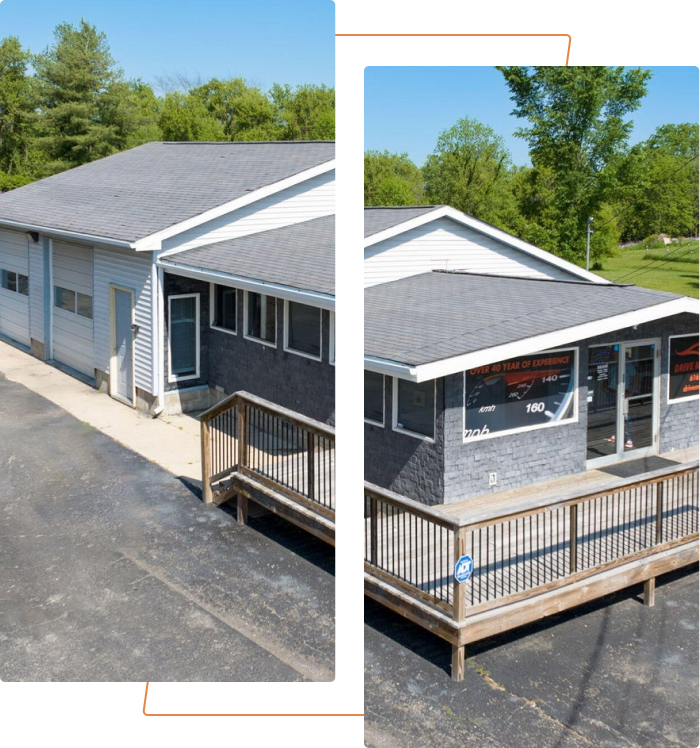327 W. Main Street, Suite 2, PO Box 65 Ionia, MI 48846
CALL US TODAY 616.522.6006
Buying a Home in Ionia County, MI
When it comes to homeownership, it’s hard to beat the U.S. spirit. It’s a cornerstone of the American Dream: a symbol of independence and financial security.
Purchasing a home isn’t just about having a place to crash; it’s an investment into your future. You can build equity, get tax returns, and even look forward to making a tidy profit if you decide to sell.
Dollars and cents aside, homeownership lets you put your roots down in your community and live comfortably. You don't have to worry about a landlord selling the property or deciding to increase your rent. It’s the ultimate peace of mind.
At Riverside, we know just how monumental buying a home can be. And we can help you get a step closer to your goals. Your dream home is out there, and we'll work tirelessly to help you find it.

Our Home Buying Process
Ready to jump into the home buying process? Here’s a step-by-step guide to buying a home with Riverside Realty.
1
Pre-Approval
It’s a good idea to get pre-approved for a mortgage before diving into your home search. Not only will this help sort your budget, but it’ll also let sellers know you’re a serious buyer. Our realtors can connect you with trusted lenders to make this process smoother.
2
Initial Consultation
Next, you sit down for a friendly chat with our realtors. We’ll get to know you, your preferences, and your priorities to tailor the home search accordingly.
4
Property Showings
Buying property is hard work- but hang in there! We’ll schedule showings at your convenience, so you can walk through homes and get a feel for what suits you best. We’ll answer all your questions and offer insights into each estate.
3
Home Search
Once we’ve got a clear picture of what you’re looking for, our team will scour for potential homes that match your criteria. Being plugged into the local market, we can find options you might not discover on your own.
5
OFFERS AND NEGOTIATIONS
Buying property is hard work- but hang in there! We’ll schedule showings at your convenience, so you can walk through homes and get a feel for what suits you best. We’ll answer all your questions and offer insights into each estate.
6
Due Diligence and Inspections
It’s crucial to ensure your dream home is as dreamy as it seems. We’ll walk you through inspections, appraisals, and finalizing your mortgage, so you don’t come across any hidden surprises down the line.
8
Post-Purchase Support
We believe in building lasting relationships with our clients. Even after you’ve moved into your new home, we’ll only be a phone call away. Feel free to get in touch if you have questions, need recommendations for local amenities, or just want to catch up!
7
Closing Process
This is where it all comes together. We’ll work closely with all parties involved (lenders, title companies, and attorneys) to close the deal quickly and efficiently. All you need to do is sign the necessary documents and pick up the keys to your new home!
Benefits of
Buying a Home
-
Building Equity:
Each mortgage payment you make increases your ownership stake, building equity over time. It’s almost the same as a forced savings plan.
-
Long-Term Investment:
Historically, homes grow in value and are quite likely to bring in a substantial return on investment.
-
Tax Advantages:
Owning a home allows you to enjoy tax benefits like deductions for mortgage interest and property taxes. This, in turn, leads to a reduced tax bill.
-
Stability:
Homeownership offers a sense of stability without the uncertainty of rent increases or eviction.
-
Sense of Belonging:
When you buy a home, you establish roots in a community and create a place to make lasting memories.
-
Retirement Nest Egg:
A paid-off home can serve as an asset in retirement. You can retire and live out your golden years in your very own sweet haven!
Like many people, you’ve probably wondered if the home buying process is worth your while. The short answer? It is. Let’s take a quick look at the many benefits of buying a home.

mortgage calculator
Why Choose Riverside Realty for Residential Real Estate Buying in Ionia County, MI?
So, what makes us the go-to for home buying in Ionia County? We’re glad you asked!
1
Dedicated Support:
We customize your home search to match your specific preferences. Plus, we offer personalized guidance and support at every step of the home buying process.
2
Experienced Professionals:
Our seasoned realtors have been around for a long time. As such, they can assist you through negotiations and inspections hassle-free. Just sit back and leave the logistics to us!
3
Trustworthy Reputation:
We’re known for our integrity and commitment to client satisfaction. We aren’t happy with the deal until you are.
4
Local Experts:
We’ve been part of Ionia County for years, and have an in-depth understanding of local neighborhoods, schools, and amenities. Our team can provide you with access to valuable resources and insights.
5
Honesty:
We prioritize transparent communication and offer honest advice throughout the buying journey.
Riverside Realty exceeds our client's expectations by being present, confident, and knowledgeable throughout the whole home buying process. In the past decade, we've assisted over 150 individuals and families with the purchase of a new home.
Before engaging in any sale, we take the time to get to know each property and client. To support our staff and ensure that our entire team is in top form, we conduct market research, print advertising, innovative computer technology, international social media exposure, in-house meetings, and frequent seminars.
Our Service Area
From picturesque landscapes to bustling neighborhoods, Riverside is dedicated to helping you find the perfect home across these service areas in Michigan.
lonia
Lowell
Forest Hills
Belding
Portland
Saranac
Clarksville
Lake Odessa
Lyons
Muir
Pewamo
Fowler
Greenville
Cascade
Grand Rapids
Lansing
FREQUENTLY ASKED QUESTIONS
-
How long does the home-buying buying process take?
Honestly, it depends. Factors such as financing, inspections, and negotiations can impact your home buying timeline. Generally speaking, it could take you anywhere between a few weeks to several months.
-
What are the additional costs involved in buying a home?
Yes! Additional costs may include title fees, appraisal, insurance, property taxes, homeowners’ insurance, and potential HOA fees.
-
How can I determine the right price to offer?
The best way would be to work with your real estate agent to assess market conditions, comparable home prices, and your budget. Doing this will help you craft a budget for your purchase.
-
Are there any incentives for first-time homebuyers?
Again, it varies by region. Many areas do offer incentives, like down payment assistance programs, tax credits, or favorable loan terms. Check with your local government and lenders for options.
-
Can I buy a home if I have bad credit?
While a lower credit score might limit your options, you can still buy a home. You may need to work on improving your credit, explore FHA loans or consider co-signers.
-
What should I consider when choosing a neighborhood?
There are plenty of factors to consider, such as proximity to work/school, safety, amenities (parks, shops), property values, school quality, and future development plans. You can visit the neighborhood at different times to get a feel for it.
-
How can I schedule a home viewing?
Reach out to your real estate agent. They will coordinate and schedule home viewings based on your preferences and availability.
-
What documents do I need for the closing process?
Usually, you will need your photo ID, proof of homeowner's insurance, mortgage documents, and any additional paperwork requested by your lender or the title company. Your real estate agent will guide you through this process.
Our Resources


Want to buy or sell property?
Call us today
Quick Links
Properties
Agents
Quick Links
Properties
Agents
Contact Info

327 W. Main Street, Suite 2, PO Box 65 Ionia, MI 48846

Monday-Sunday (By Appointment)
- Licensed REALTORS® & Real Estate BROKERS®
- Members of the National Association of REALTORS®
- Members of the Michigan Association of REALTORS®
- Members of the Greater Regional Alliance of REALTORS®
Riverside Realty is a Christian-based company that was born in 2017, when James Buxton and Aimee Knudson were introduced to each other through a mutual friend, as both were looking to make changes in their individual real estate careers.
website by SPECK DESIGNS







